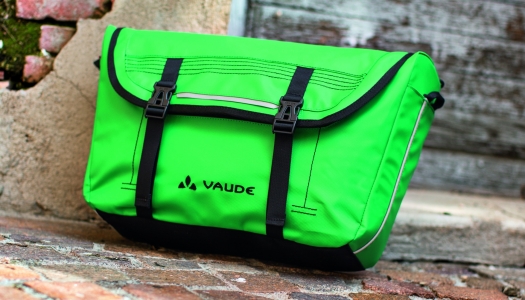
The challenges of PVC-free
Waterproof with eco-friendly alternatives
PVC (Polyvinyl Chloride) is a very stable and durable material used in the manufacturing of canvas-like products such as bags.
One problem with the plastic PVC is the phthalates that they often contain. Phthalates are plasticizers that keep PVC from being brittle. Phthalates are considered to be carcinogenic. There are strict limits to their use, but until now, these have only been in effect for children’s products.
Risks from additives
PVC is not only problematic due to the use of plasticizers; it is problematic throughout its entire lifecycle. PVC itself is inert (non-reactive, non-effective) and non-toxic.
Additives are the main problem, and they are present in PVC in greater concentrations than in other common synthetics.
Plasticizers can outgas
Plasticizers are “only” a problem during their utilization phase as they can outgas from finished PVC. The plasticizers used by VAUDE are approved in accordance with European chemical legislation (REACH).
In addition, the production and disposal of PVC involves other serious environmental and health problems.
PVC manufacturing is problematic for humans and the environment
PVC production starts with the gas vinyl chloride, which has been known to be carcinogenic since the 1960s. It triggers “vinyl chloride disease”, recognized as an occupational disease.
In addition, toxic chlorine compounds are used as flame retardants, and larger amounts of heavy metals, particularly cadmium, are needed for the production of PVC, which partly remain detectable in the finished product.
Landfilling of PVC is illegal in Germany
It is virtually impossible to recycle PVC as it consists of various polymers which can only be separated again under extremely high energy and water use.
If PVC is deposited in a landfill, plasticizers and other harmful substances such as heavy metals leech into the soil, air and groundwater. In Germany PVC landfilling is illegal.
During the combustion of PVC in incinerators, toxic hydrogen chloride, dioxins and other hazardous pollutants are created. Therefore, PVC is not suitable for energy production through combustion in furnaces or in the cement industry.

|
Guaranteed waterproof
Our “Hot Couture Fashion Bags” Collection is made entirely without the use of PVC and therefore can be named “PVC-free”. |
PVC-free production in the works
Since there are no ideal alternatives to PVC for products with a classic canvas look as yet, VAUDE continues to use PVC in some bag models. This material, however, does not contain any phthalate plasticizers, is REACH compliant and its use is strictly limited. By 2018, we aim to completely withdraw from the use of PVC. This is a real challenge, because the material is about 30 percent more expensive. Currently, we are unsure whether we will reach this goal.
We already have some (enormously successful) products that are manufactured completely without the use of PVC. These are the only ones that have the PVC-free label. One example is the “Hot Couture Fashion Bags”. They are just as waterproof as bags with PVC, but are coated with PU (polyurethane) materials.
| GRI: | EN1 |
| GRI: | PR6 |




